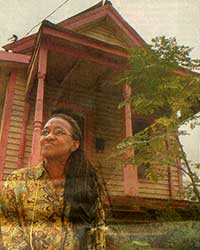
Impact Touches Many Areas
Blacks have long contributed to state
By Richard Bailey
Jesse Owens, Nat King Cole, Joe Louis.
African-Americans with Alabama ties have rendered an invaluable service to the state and nation.
In military affairs, “Major” Jeffreys fought with Andrew Jackson in Mobile during the War of 1812. Alamo Joe, also known as Joe Travis, was a slave of William Barrett Travis and the sole male survivor at the Alamo. James H. Alston, later of Tuskegee, was a drummer in the Mexican War. John Carraway of Mobile wrote ” Colored Volunteers,” the most popular tune of black troops during the Civil War.
In the 20th century, Charles “Chief” Anderson trained blacks at Moton Field for air combat. Trying to rescue his mates at Pearl Harbor, Julius Ellsberry of Birmingham became the first Alabama black to die in World War II. William A. Campbell, of the 99th Fighter Squadron, was the first black to bomb enemy territory in the same war.
Showing political savvy, Reconstruction blacks helped to establish the Alabama Republican Party, churches, schools, banks, and labor unions. Benjamin S. Turner,
James Thomas Rapier, and Jeremiah Haralson were elected to Congress. Elected in 1882, W. P. Williams of Meridianville was the last black statewide officeholder of the 19th century.
Thomas Reed and Fred D. Gray reintroduced blacks to statewide officeholding in 1970 – nearly 88 years after Williams’ election – under the banner of the Democratic Party. They continued to advance the welfare of blacks. Earl F. Hilliard is the sole black congressman of the 20th century.
In education, Emerson Institute of Mobile became the state’s first black college in 1865. William Savery was the guiding force behind the establishment of Talladega College in 1867, while William James Edwards founded Snow Hill Institute in 1893.
At Tuskegee Institute, Booker T. Washington’s faculty reads like a who’s who of academia: Warren Logan handled finance; Monroe Work headed historical research; Cleve Abbott’s sport teams were nearly unstoppable; George Washington Carver traveled uncharted paths in scientific research; Thomas Campbell and Clinton J. Calloway advanced the farm extension program; Clement Richardson excelled in literature; Emmett J. Scott was Washington’s secretary until he was called to work in Washington; and Robert Park, a white faculty member, helped to establish social work at the University of Chicago after leaving Tuskegee.
Such names as Martin Luther King, Fred Shuttlesworth, and Ralph D. Abernathy helped to make Alabama the civil rights capital of the world. Adding to this list the names of Joseph Lowery, Arthur Shores, Rosa Parks, Albert Turner, Jimmie Lee Jackson, Fred D. Reese, E. D. Nixon, Gwendolyn Patton, and Bob Mants will cause readers to assume that having Alabama ties is a prerequisite for work in civil rights. Alabama blacks have held their own in athletics, too. Joe Louis and Jesse Owens excelled at the time when blacks had few national heroes.
Through the talents of Satchel Paige, Henry Aaron, Cleon Jones, Monte Irvin, Willie Mays, Willie McCovey and Bo Jackson, Alabama has been well represented in baseball. The state has two heavyweight champions in Louis and Evander Holyfield.
Alabama blacks sang with the Temptations and the Drifters. Prominent entertainers have included Dinah Washington, Nat King Cole, Big Mamma Thornton, W. C. Handy, and Wilson Pickett.
Percy L. Julian and Levi Watkins Jr. have continued the pace established in science by Carver. Andrew Jackson Beard invented the railroad coupler, and Isaac Hathaway was one of the nation’s most celebrated sculptors.
In literature, Margaret Walker Alexander, Jim Haskins, and Sonia Sanchez have written for wide audiences.
When Alabama builds on the record of these achievers, the future becomes as bright as the past.
~
Richard Bailey is a historian and the author of the book, “They Too Call Alabama Home: African American Profiles, 1800-1998. “
Montgomery Advertiser, 1999

